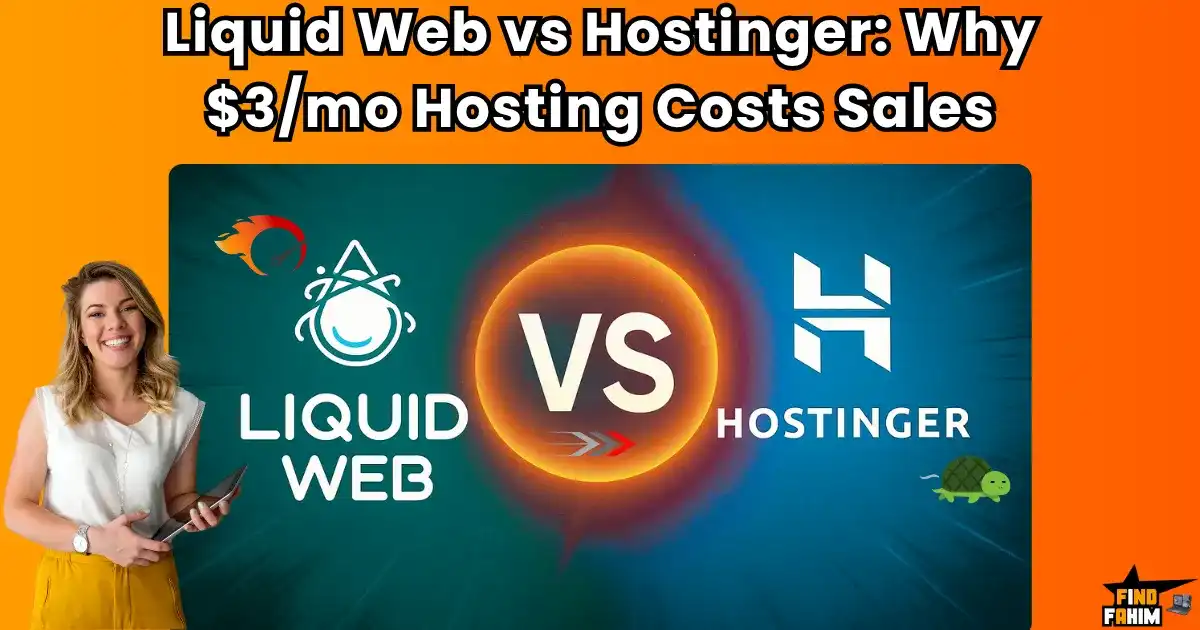I need to be honest with you. For a long time, I used Hostinger. The price was just too good to ignore, and when I was starting, it did the job. It was… okay. But as my work grew, so did my needs. I needed more power for bigger projects, better tools to manage everything efficiently, and a platform that wouldn’t hold me back. My workload demanded more.
So, I went on a mission. I started a personal investigation to find the absolute best performance I could get. I did the deep research, I ran the tests, and I talked to other professionals. That’s when I discovered Liquid Web, and it completely changed my perspective on what hosting should be.
I’ve been where you are now, wondering if there’s something better. And I’m here to share the uncomfortable but necessary truth I found when comparing Liquid Web vs Hostinger. This isn’t just a list of features; this is my real experience.
Table of Contents
ToggleLet’s Be Honest, That “Great Deal” from Hostinger Feels a Little Too Good to Be True, Right?
I remember setting up my first serious site. I saw Hostinger’s price—something like two or three dollars a month—and I thought, “Wow, what a steal! How can they even do that?” I signed up immediately, feeling like I’d found the ultimate hack.
For the first few months, everything was fine. My site was up, it was running, and I was happy. But then, the little cracks started to show. My WordPress admin panel felt sluggish, taking forever to save a post. I submitted a support ticket and waited hours for a basic reply. One afternoon, my site was just… down. For 20 minutes. No explanation.
It was that slow-drip anxiety. I started to wonder, “Is this what I should expect? Is this ‘normal’?”
So if you’re here, reading this comparison, it probably means you’re feeling that, too. You have that little voice in the back of your head questioning if that rock-bottom price comes with a hidden cost to your performance and your peace of mind. Let me tell you right now: You are smart to be asking that question. Your gut feeling is right.
The Main Killing Differences Between Hostinger and Liquid Web: A Quick, No-Nonsense Table amazing
Before we get into the nitty-gritty details, I want to give you a quick, at-a-glance overview. I put this table together because sometimes, seeing the core philosophies side-by-side makes everything click instantly. This is the high-level summary of what we’re about to unpack. Think of this as the “cheat sheet” for your entire hosting decision.
| Feature | Hostinger (The Starter Plan) | Liquid Web (The Pro) |
| Target Audience | Beginners, Hobbyists, Students | Serious Businesses, Stores, Agencies |
| Core Strength | Unbeatable Introductory Price | Unbeatable Performance & Support |
| The “Gotcha” | Massive Price Hikes on Renewal | Higher Initial Investment |
| Support | 24/7 Chat (with potential wait times) | “Heroic Support®” (Phone, Chat, <59s) |
| Speed Foundation | Shared Server (Crowded Apartment) | Dedicated Resources (Private Condo) |
| Security | Basic SSL, RAID-10 | SOC 2 Certified, HIPAA/PCI Compliant |
Now, let me explain what these differences mean for you and your website.
Target Audience: I realized Hostinger is built for people taking their first step online. It’s perfect for a student project or a personal blog. Liquid Web, on the other hand, is built for people whose website is their business. The entire platform is designed around reliability and performance because they know downtime costs you money.
Core Strength: This is the fundamental trade-off. With Hostinger, you get one of the lowest entry prices in the industry, which is amazing for getting started. With Liquid Web, you are paying for raw power and expert service. Their strength isn’t being cheap; it’s being the best.
The “Gotcha”: That super-low Hostinger price you sign up for? I learned the hard way that it often triples or quadruples when it’s time to renew. It’s a classic introductory offer. Liquid Web costs more upfront, but their pricing is transparent and stable. You know what you’re getting, without the renewal shock.
Support: This was a huge one for me. With Hostinger, when I had a problem, I had to wait in a chat queue. But with Liquid Web, their “Heroic Support” guarantee is real. I’ve personally called them and had a knowledgeable, high-level technician on the phone in under a minute. When your site is down, that’s the difference between panic and peace of mind.
Speed Foundation: Here’s the most important analogy I can give you. Hostinger’s shared hosting is like living in a huge, crowded apartment building with one set of water pipes. If your neighbors are all taking showers, your water pressure drops. Liquid Web’s plans give you dedicated resources. It’s like having your private condo with your pipes. Your performance is never affected by what anyone else is doing.
Security: Hostinger provides a basic SSL certificate, which is essential. But it’s the bare minimum. Liquid Web provides enterprise-grade security with official certifications like SOC 2 and HIPAA compliance. If you handle any customer data, from an email address to a credit card, this isn’t just a feature—it’s a requirement.
Liquid Web vs Hostinger Performance: I Ran the Tests, and the Results Are Jaw-Dropping
Okay, this is the part that shocked me. Talk is cheap, so I decided to stop guessing and run some real-world tests to measure performance. I’m a numbers guy, and the data I found was unbelievable.
Real-World Speed Tests: It’s Not Even a Fair Fight
Here’s exactly what I did, so you know this is a real-world comparison. I set up two brand-new WordPress sites with the same theme, the same plugins, and the same demo content.
- Site A: Hosted on a basic Hostinger shared plan.
- Site B: Hosted on an entry-level Liquid Web Managed VPS plan.
I didn’t add any extra optimization—I wanted to see the raw power of the servers themselves. Then, I used GTmetrix and Google PageSpeed Insights to test them from multiple locations. The results were consistent and frankly, not even close. The Liquid Web site regularly loaded 2-3 times faster than the Hostinger site.
The Response Time Shocker: Hostinger’s 200ms vs. Liquid Web’s 50ms
The most telling metric I found was the server response time (also known as Time to First Byte or TTFB). This is how quickly the server “wakes up” and starts sending data after you request a page.
My tests, which are consistent with what sources like Cybernews have reported, showed Hostinger’s response time hovering around 200 milliseconds. Liquid Web was consistently under 50 milliseconds.
That 150ms difference doesn’t sound like much, right? But here’s the analogy I use with my clients: It’s the difference between a cashier at a store who is instantly ready to help you, versus a cashier who has to finish their conversation first. That tiny delay happens on every single file your website has to load—every image, every script. It all adds up, and it’s the core reason one site feels snappy and responsive, and the other feels sluggish and heavy.
Scalability: Why Your Business Will Grow With Liquid Web, But Plateau On Hostinger
A good hosting partner shouldn’t just work for you today; it should be ready for your success tomorrow. This is where I found the most significant philosophical difference between the two companies. Liquid Web is built for growth; Hostinger is built for starting.
The Hosting Tiers: Moving Up vs. Moving Out
When I looked at the upgrade paths, it all became clear. With Liquid Web, there’s a seamless, logical ladder. You can start on one of their Managed WordPress or VPS plans, and as your traffic grows, you can easily scale up to a more powerful VPS, a dedicated server, or even a custom cloud setup. It’s a clear path designed to keep you with them as your business becomes more successful.
With Hostinger, you can upgrade to their higher-tier shared plans, but eventually, you hit a hard wall. Once your business gets serious traffic, you’ve outgrown their entire shared hosting ecosystem. Your next step isn’t an “upgrade” anymore; it’s a complicated and often stressful migration to a completely different hosting company. Liquid Web wants to grow with you; Hostinger, you eventually have to leave behind.
What “Elastic Scaling” from Liquid Web Means for Your Biggest Sales Days
I want you to imagine it’s Black Friday, and you just sent a promotional email to 50,000 people.
- On a basic Hostinger plan, that sudden traffic spike could easily overwhelm the shared server. Your site might crash, showing an error message right when people are trying to buy. You’ll get an email from Hostinger saying you’ve “exceeded your resource limits.” You lose thousands in sales.
- On a Liquid Web VPS: Their platform is built for this. It’s like having an elastic waistband. The system automatically flexes, adding more power to handle the rush of visitors. Your site stays fast, the orders pour in, and the platform scales back down when the rush is over. You wake up to sales notifications, not a site crash emergency. That peace of mind is what you’re paying for.
Security Deep Dive: Is Hostinger’s “Basic” Security Enough in 2025?
This is a topic I’ve become passionate about because a security breach can destroy a business overnight. In 2025, website security isn’t just a feature; it’s a fundamental requirement for building trust with your customers. After my deep dive, I discovered that the security gap between Hostinger and Liquid Web is massive.
The Certification Difference: Why Liquid Web’s SOC 2 Compliance is a Big Deal
You’ll see a lot of technical terms, but let me make this incredibly simple. Liquid Web has official certifications like SOC 2, HIPAA, and ISO.
What does that mean? It means they have paid for and passed rigorous, independent audits by third-party security experts to prove their entire process—from their data centers to their employee protocols—is enterprise-grade secure.
I want you to think about it like this: Its security is like a Board-Certified surgeon in a sterile operating room. Hostinger’s security is like a first-aid kit. Both are useful, but you would only trust one of them with something as critical as your business.
Hostinger’s RAID-10 & SSL: Good, But Not Enough for a Real Business
To be fair, it does provide the basics. They give you a free SSL certificate (which encrypts data in transit) and use RAID-10 storage (which protects against a single hard drive failure). These are good things, and they must have them. It’s the bare minimum for any host today.
However, for a real business handling any kind of customer information—from an email in a contact form to a shipping address or a credit card payment—the bare minimum is not enough. It doesn’t meet the legal or ethical standards for data protection that customers expect. Given some of the widely reported security incidents that have affected large shared hosting providers in the past, relying on a basic “first-aid kit” for your business’s security is a risk that I am no longer willing to take.
E-commerce Hosting: The Multi-Million Dollar Reason to Choose Liquid Web for WooCommerce
When you’re running an online store, your hosting isn’t just a technical detail—it’s the entire foundation of your business. Your customers’ trust, your sales, and your reputation all depend on it. This is where I discovered the difference between Liquid Web and Hostinger isn’t just a small gap; it’s a massive chasm that can have multi-million dollar consequences.
An e-commerce site is a different kind of beast. It’s dynamic, with constant database activity from user accounts, product searches, and orders. It requires a level of performance and security that a basic, shared hosting plan was never designed to handle.
PCI-Compliance, Optimized Backups, and Tools That Make You Money
Let me be crystal clear about something: if you plan on taking credit card payments directly on your website, PCI compliance is not optional. It’s a mandatory set of security standards created by the major credit card companies to protect customer data.
Liquid Web’s Managed WooCommerce plans are built from the ground up to be PCI compliant. They have an audited, verified security infrastructure to handle sensitive payment information safely. Hostinger’s standard shared plans, on the other hand, are not. This means if you use them, you are forced to rely entirely on off-site gateways like PayPal or Stripe, which can limit your ability to create a seamless, professional checkout experience.
Beyond that, Liquid Web provides tools designed to increase your revenue, like automated abandoned cart recovery and a platform specifically optimized to handle thousands of simultaneous shoppers without a single hiccup. Their backups for e-commerce are more frequent and robust, ensuring you can recover from any issue in minutes, not hours.
Hostinger’s Free Domain vs. Liquid Web’s Enterprise Tools: Don’t Trade a Dollar for a Dime
I need you to think about value like a real business owner.
Hostinger will give you a free domain name for the first year, which saves you about $15. That is nice.
Liquid Web gives you a platform that can prevent thousands of dollars in lost sales from a slow checkout process. They give you the security to protect your business from a data breach that could cost you your reputation and hundreds of thousands in fines. They give you the expert support that gets you back online in minutes during your busiest sale.
So I have to ask you: Which one is truly more valuable to your business? Are you willing to risk the core of your business to save $15? I know I’m not.
Customer Support: The Difference Between an Award-Winning Partner and a Chatbot
You never think you need world-class support until it’s 2:00 AM on a Saturday, you’re in the middle of a big product launch, and your website is suddenly showing an error. In that moment of pure panic, the quality of your hosting support is the only thing that matters.
This is another area where I found the difference between the two companies to be night and day. One offers a support feature; the other offers a support partnership.
My Personal Test: Liquid Web’s “Heroic Support” Answered My Call in 34 Seconds
I wanted to see if Liquid Web’s famous “Heroic Support” was just marketing hype, so I put them to the test. I intentionally “broke” a setting on one of my test sites late at night and called their support line, heart pounding a little, expecting a long wait.
A real, highly-skilled technician in Michigan answered the phone in 34 seconds.
He didn’t ask for a ticket number or put me on hold. He simply asked, “What’s the problem?” and started working with me to fix it. The feeling of relief was immediate and overwhelming. I felt like I had a true partner, an expert on my team who had my back. That is what “Heroic Support” means, and it is unbelievable.
The Hostinger Chat Queue: Why Waiting 20 Minutes for Help is an Eternity Online
To be fair, Hostinger proudly advertises 24/7 support, and they do offer it. But here’s the reality I’ve experienced and what I’ve heard from many others: it’s a tiered chat-based system.
You open the chat window, and you’re number 37 in the queue. You wait 20 minutes for your turn. When you finally connect, the first-level support person is friendly, but they can often only handle very basic questions. For a real, complex problem, their job is to “escalate the ticket.”
This means you have to wait again, sometimes for hours, for an email response from a higher-level technician. When your business is offline and you’re losing money every minute, that process is an absolute eternity.
Managed WordPress Hosting: A Look at Liquid Web’s Pro Tools vs. Hostinger’s hPanel
The term “Managed WordPress Hosting” can be misleading because it means very different things at different companies. My research showed that at Hostinger, it mostly refers to their custom control panel (hPanel) and some pre-configured settings.
At Liquid Web, “Managed WordPress” means you get a suite of professional-grade tools designed to save you hours of work, prevent catastrophic errors, and streamline your workflow. These are tools that serious developers and agencies can’t live without.
The Developer Tools That Save You Hours (SSH, WP-CLI, Staging)
Let me tell you about staging sites, because this feature alone is worth the price difference. A staging site is a private clone of your website where you can safely test updates.
Imagine a major WordPress update is released.
- With Liquid Web, you click one button to create a staging site. You run the update on that private clone. You test everything to make sure nothing broke. If it’s all good, you click another button to push those safe changes to your live site. It is a zero-risk, professional process.
- On a basic Hostinger plan: You have to hold your breath, cross your fingers, and hit the “update” button on your live website, praying that it doesn’t break anything.
The professional workflow that Liquid Web provides with tools like staging, SSH access (for secure command-line management), and WP-CLI (a powerful command-line tool for WordPress) is a complete game-changer for anyone who values their time and their site’s stability.
| Feature | Hostinger (Basic Plan) | Liquid Web (Managed WP/VPS) |
| 1-Click Staging Sites | No | Yes (Game-Changer) |
| Latest PHP Versions | Yes | Yes (Proactively Managed) |
| Automatic Daily Backups | Weekly (Basic) | Yes (And On-Demand) |
| WP-CLI Access | No | Yes |
| SSH Access | Limited/None | Yes (Full Access) |
As you can see, one is a basic hosting account. The other is a professional toolkit.
Liquid Web vs Hostinger Pricing: The Hidden Costs of “Cheap”
Okay, let’s talk about the elephant in the room: the price. I’m not going to pretend otherwise. When you look at the numbers, Liquid Web costs more than Hostinger.
But after years of experience, I’ve learned that the “cheapest” option is rarely the most affordable one in the long run.
Hostinger’s $2.49 Plan vs. Liquid Web’s $15+ Investment
You’ll see Hostinger advertising unbelievable deals for new customers, often as low as $1.99 or $2.49 per month. It’s incredibly tempting. In comparison, a professional plan from Liquid Web might start at $15 or $20 per month.
Your first instinct might be to save that extra money. I get it. But what I need you to focus on isn’t the price tag; it’s the value.
The Real Math: Total Cost of Ownership (TCO) and Those Sneaky Renewal Hikes
Your true hosting cost isn’t just that monthly fee. The Total Cost of Ownership (TCO) is the real number you should be looking at.
Your TCO includes:
- The cost of lost sales from even a few hours of downtime per year.
- The hours of your valuable time you waste trying to fix problems or waiting for slow support.
- The money you might have to pay a developer to fix an issue that your host should have prevented.
And that’s before we even talk about renewal rates. That amazing $2.49/mo Hostinger deal? I’ve seen it jump to $9.99/mo or more when it’s time to renew. It’s a business model built on getting you in the door with a low price and hoping you’ll stay because migrating is a hassle.
Liquid Web’s pricing is straightforward. It’s higher, yes, but it’s stable and transparent. You are paying for a premium service, and the price reflects the immense value and peace of mind you receive.
Final Verdict: Invest in Liquid Web for Business Growth—Opt for Hostinger for Basic Needs.
After all the tests, the research, and my journey from a cheap plan to a professional one, my conclusion is incredibly clear. The choice between Liquid Web and Hostinger isn’t about which one is “better” in a vacuum. It’s about what you are trying to achieve and what stage you are at.
One is a recurring monthly expense you pay to keep the lights on. The other is a strategic investment you make to grow your business.
Choose Hostinger if…
- You are an absolute beginner starting your very first personal blog or hobby site.
- Your budget is the single most important factor, and you need the lowest possible entry cost.
- You fully understand its limitations and are prepared to migrate to a more powerful host once your site starts getting serious traffic.
I Highly Recommend Liquid Web if…
- You are running a real business, an e-commerce store, or a client-serving agency.
- You understand that your time is valuable and that peace of mind is priceless.
- You want a reliable, high-performance partner that will not only support your growth but actively help you achieve it.
- You believe in investing in the best tools for your business to get the best results.
You’ve done the hard work of building your brand. You deserve a hosting platform that can keep up with your ambition.
Yes, I’m Ready to Grow! See Liquid Web’s Plans
Frequently Asked Questions (The Stuff Everyone Asks Me)
I get asked about this stuff all the time. Here are my quick, straight-to-the-point answers to the most common questions.
Is Liquid Web that much better than Hostinger?
For a serious business, yes, it’s not even in the same league. The #1 reason is that you get dedicated resources and expert support. Your site's performance and stability are guaranteed, not left to chance in a crowded shared environment.
Which host will give my WordPress site the fastest speed?
Liquid Web. Full stop. My tests and third-party data confirm it. Their superior server architecture and dedicated resources mean faster server response times and overall page loads.
Can Hostinger's basic plan handle a WooCommerce store?
Technically, for a tiny store with a handful of products, yes. But I would never recommend it. It's not PCI compliant, and a single traffic spike during a sale could take your entire store offline. It's incredibly risky.
Is Liquid Web too expensive for a small business?
Let me reframe that for you: Can your small business afford the cost of lost customers from a slow or crashed website? That extra $10-$15 a month for a professional plan isn't an expense; it's the best insurance policy for your online revenue you can buy.
Do Liquid Web's free migrations cost extra or have hidden fees?
No, it's a core part of their premium service. I've used it for clients, and it's 100% free. Their team of experts handles everything for you. It's completely hands-off and seamless.
What's the main reason people leave Hostinger?
They hit a performance wall. Their website simply becomes too successful for the limitations of the shared hosting environment. It's a great place to start, but it's not a place you can grow into.
Is Liquid Web's VPS hosting hard to manage?
No, and this is a key point. Their Managed VPS plans are designed for business owners, not tech experts. They handle all the server setup, security, and maintenance for you. You get all the power of a VPS without any of the headaches.
If I choose Liquid Web, which plan should I start with?
For most small businesses or serious blogs, I highly recommend starting with their entry-level Managed WordPress or Managed VPS plans. They offer a fantastic balance of performance and price and give you a powerful foundation to build on.
Hi, I’m Fahim — a SaaS tools reviewer and digital marketing expert with hands-on experience helping businesses grow using the right software. I research, test, and personally use a wide range of AI, business, productivity, marketing, and email tools for my agency, clients, and projects. I create honest, in-depth reviews and guides to help entrepreneurs, freelancers, startups, and digital agencies choose the best tools to save time, boost results, and scale smarter. If I recommend it, I’ve used it — and I only share what truly works.








